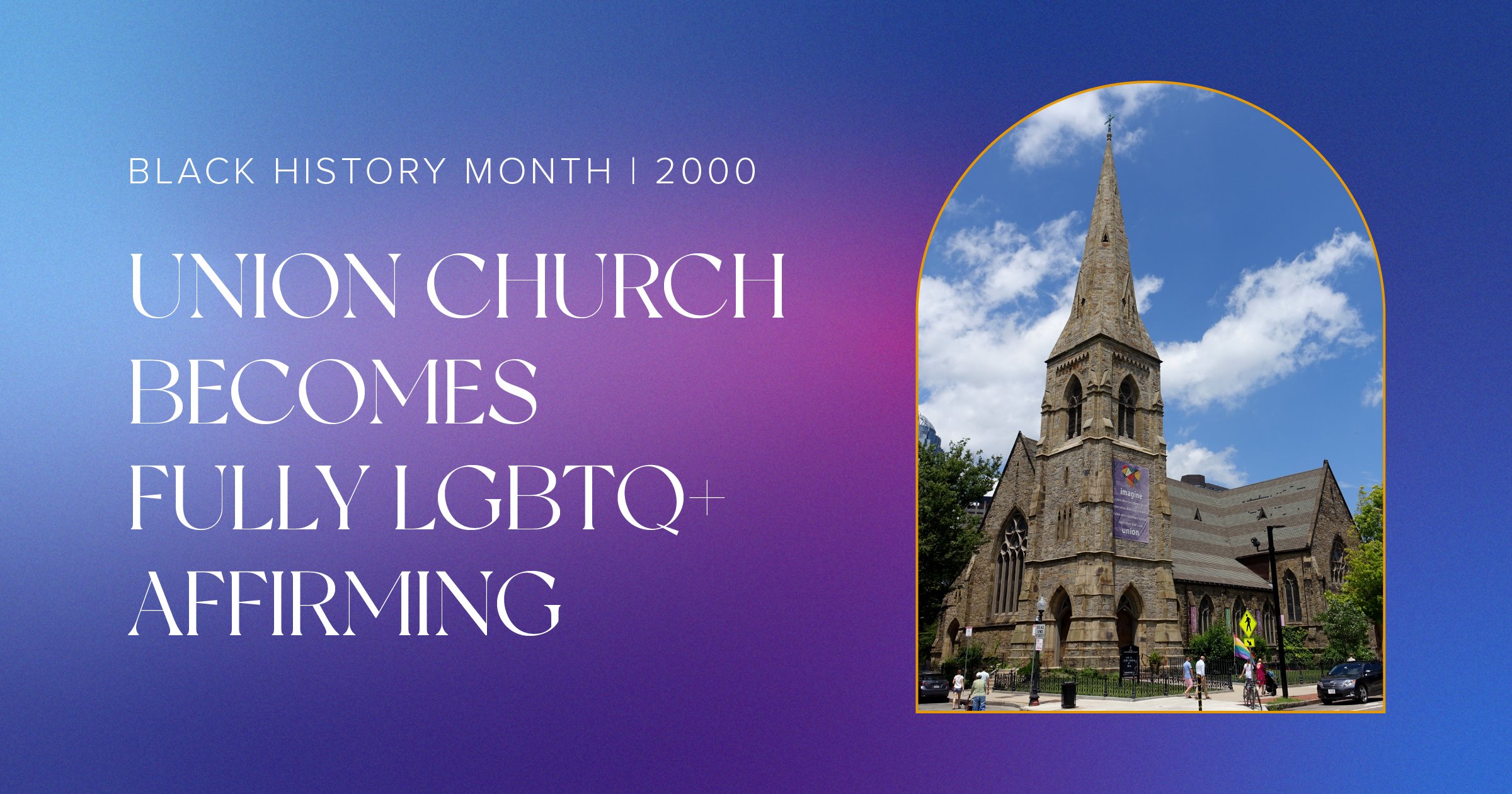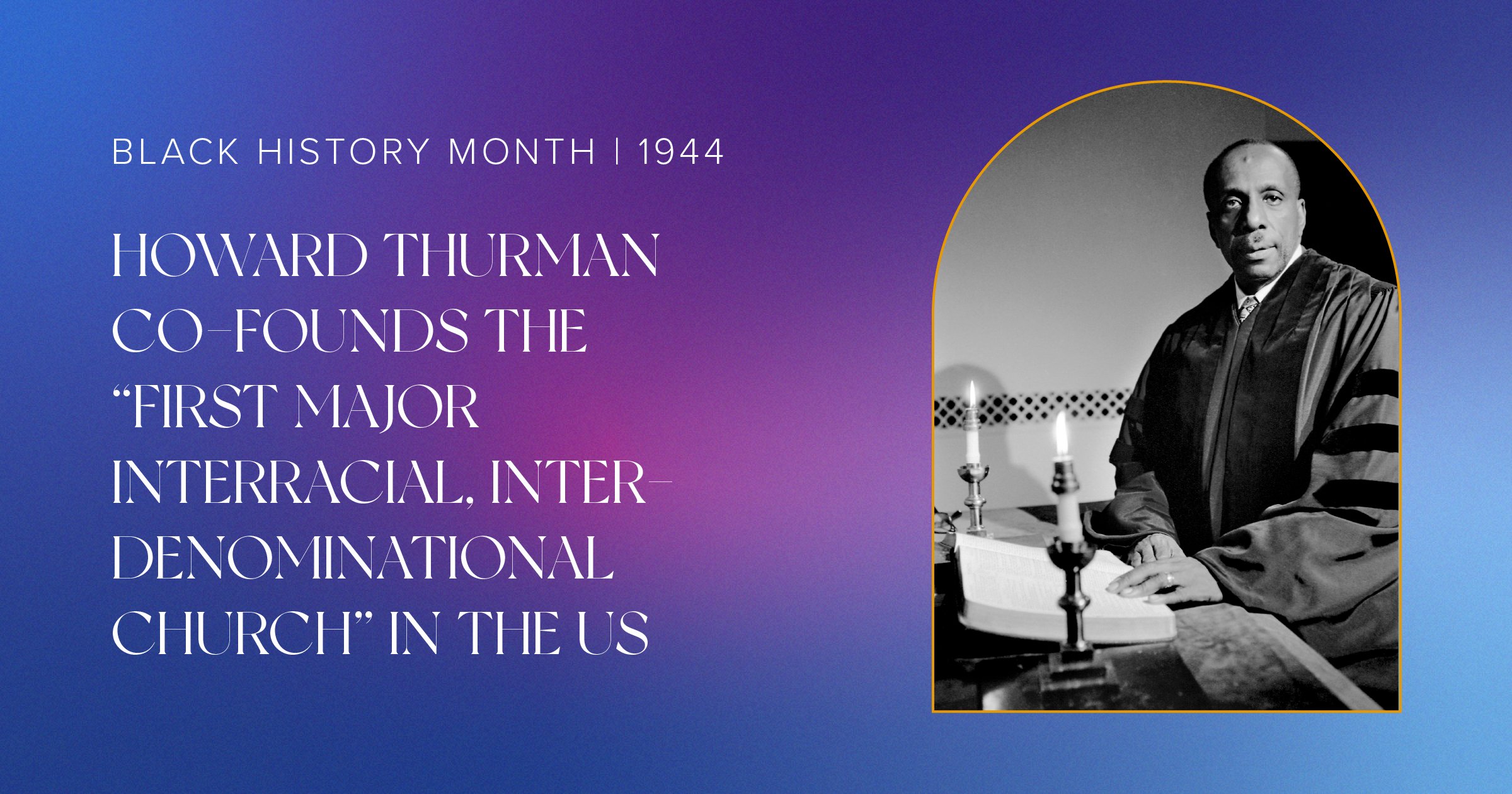Celebrating Black History Month
February is #BlackHistoryMonth, and this year, we’re celebrating Black joy, excellence, and pride. 🙌🏿
Over the past several weeks, we’ve been highlighting moments from throughout Black history that speak to these themes at the intersection of faith and justice. Whether it’s Bishop Desmond Tutu’s history-making appointment as Archbishop of Cape Town or Rev. Dr. Emilie Townes’s appointment as Dean of the Vanderbilt School of Divinity, there are moments we celebrate as pivotal in the pursuit of justice, equity, and radical belonging for Black lives in the Church around the world.
Black history is being made every day. May eyes be opened to the Spirit’s ongoing work.
Week 1
Rev. Desmond Tutu is Made Archbishop of Cape Town
For the first week, we celebrated the appointment of Archbishop Desmond Tutu and his profound impact on the world.
In 1986, following an already history-making tenure as the Bishop of Johannesburg, Rev. Desmond Tutu was appointed Archbishop of Cape Town, South Africa, and became the first Black man to ever hold that position. Following the appointment ceremony, he facilitated Communion for 10,000 people, a powerful indication of the scope and reach of his ministry.
In the 8 years he served as Archbishop, he actively centered the needs of the marginalized throughout his diocese, continuing his lifelong pursuit of civil rights and equity for Black South Africans. He resisted structures of exclusivity in his own denomination, ordaining women and gay persons as priests in opposition to what he perceived to be a system similar in nature to apartheid.
Archbishop Tutu played an instrumental role in supporting South Africa's transition into universal suffrage, with the first fully multi-racial election taking place in 1994 resulting in the historic election of anti-apartheid activist Nelson Mandela as President. Thereafter, Archbishop Tutu was appointed by the President to the Truth and Reconciliation Commission to investigate abuses of human rights by proponents and opponents of apartheid.
“I would refuse to go to a homophobic heaven... I would not worship a God who is homophobic, and that is how deeply I feel about this. I am as passionate about this campaign as I ever was about apartheid.”
For the rest of his life, he was an effective agent for change. He advocated for full civil rights for LGBTQ+ citizens, later blessing his daughter's marriage to a woman. He fought for gender equality and against poverty, racism, and war. Faith and political leaders around the world looked to him for wisdom and guidance. His legacy as a justice-seeking, apartheid-fighting minister of Christ's gospel of love shapes our lives in the Church to this day, and for his witness, we are grateful.
Week 2
When Union Church Embraced Radical Belonging
During week 2, we celebrated the historic embrace of LGBTQ+ affirmation in 2000 by then-Union United Methodist Church in Boston, Massachusetts, making history as the first Black United Methodist Church to do so.
Founded in 1796, Union Church has a rich, 226-year history of advocacy for marginalized communities around the world. Founded by Black Christians and first led by abolitionist Rev. Samuel Snowden, the church has borne witness to moments of historical significance in the pursuit of civil rights for Black communities worldwide. On its website, Union goes into greater detail:
Throughout the decades Union has hosted the NAACP convention (1950) that voted to pursue Brown v. Board and the Duke Ellington Sacred Jazz Orchestra (1966). In the 1970s, Union led the development of Meth-Union Manor, a four-building affordable housing cooperative in the South End. During the 1980s and 1990s we fought against apartheid in South Africa and for economic equality for all at home.
In keeping with this tradition, Union began moving toward full affirmation and inclusion of LGBTQ+ members in the late 1990s. In the year 2000, under the leadership of Rev. Theodore L. Lockhart, the church council unanimously voted to make it official, making it the first Black United Methodist Church to do so.
“Union is a progressive, multicultural faith community in Boston with a 200-year history and commitment to Christian love, social justice, and radical hospitality.”
Twenty-two years later, Union is now pastored by Rev. Rev. Gerald "Jay" Williams, a queer man, and embraces the Spirit's call to serve the Boston community with enthusiasm. We're grateful for Union's legacy and leadership in the ongoing pursuit of radical belonging for LGBTQ+ Christians and allies. May we all follow in its example.
Week 3
The Appointment of Rev. Dr. Emilie M. Townes
During week 3, we honored the historic appointment of Rev. Dr. Emilie M. Townes as Dean of Vanderbilt University's School of Divinity.
In 2012, Vanderbilt made history by appointing Rev. Dr. Emilie M. Townes—a Black, lesbian woman—to her first 5-year term as Dean of the School of Divinity. As it is, there are few Black women who have been made deans in seminaries or schools of divinity in the United States, and with her appointment, Rev. Dr. Townes became the first Black person in this position at Vanderbilt.
A former Yale University administrator and administrator, Rev. Dr. Townes is also the Dean and Distinguished Professor of Womanist Ethics and Society; Secondary Faculty, American Studies; Affiliated Faculty, Women’s and Gender Studies; and the Director of the VDS Public Theology and Racial Justice Collaborative.
So successful was her first term that Vanderbilt proceeded to reappoint her to a second term in 2018. Provost and Vice Chancellor for Academic Affairs Susan R. Wente commented for a statement on the occasion:
Under Dean Townes’ leadership, the Divinity School has launched programs that speak to the school’s historic commitment to social justice and unveiled a new, more flexible curriculum to prepare 21st-century ministers and scholars.
In 2021, QCF had the privilege of hosting Rev. Dr. Townes as a keynote speaker during our virtual annual Conference. Her unforgettable message on what it means to "sing God's song" was given as part of our liturgical service, and it's available to stream here.
“No matter what the world hands us, we give back love. We stand for goodness. We live our faith. We live with integrity. We live God’s grace large.”
May God continue to bless her work in her role as Dean. We are grateful to Rev. Dr. Townes for her continued witness to the belonging we have in Christ and her fierce commitment to justice.
Week 3
The Founding of the "First Major Interracial, Interdenominational Church" in the US
For wee k4, we reflected on Rev. Howard Thurman and the founding of The Church for the Fellowship of All Peoples in San Francisco, CA.
Having served from 1932 to 1944 as a professor and the Dean of Rankin Chapel at Howard University in Washington, DC., legendary liberation theologian and civil rights activist Rev. Howard Thurman garnered international respect as a visionary in the faith.
In 1944, Rev. Thurman left the University and founded, along with Dr. Alfred Fisk, the first major interracial, interdenominational church in the United States. Working with the Fellowship of Reconciliation, an international coalition of nonviolent religious organizations, Thurman and Fisk planted The Church for the Fellowship of All Peoples (also known as Fellowship Church).
The community they established still exists today in the heart of San Francisco, led by Presiding Minister Dr. Dorsey Odell Blake and Co-Minister Rev. Dr. Kathryn Benton, and proudly describes itself as "an inclusive community for all."
Placing a great emphasis on the power of the Spirit in bringing about social transformation, justice and renewal are at the heart of the church's mission. The church is proud of its history and intercultural mission, cultivating radical belonging for all who seek it and embracing the power of community as a means of God's love and grace in the world.
“It cannot be denied that too often the weight of the Christian movement has been on the side of the strong and the powerful and against the weak and oppressed—this, despite the gospel.”
For reflection, we leave you with this quote from Rev. Thurman:
Community cannot for long feed on itself; it can only flourish with the coming of others from beyond, their unknown and undiscovered [siblings].





